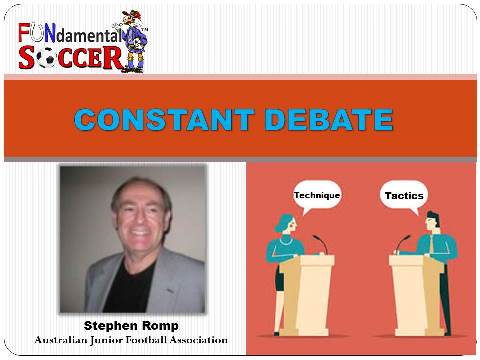Like anything in this World, we are all encouraged to learn and, when available, educate ourselves to rise to the highest possible level of achievement within our chosen fields of endeavor.
From everything we hear in the soccer community, there is a constant murmur as to the preparation of the next generation for not only the next match, but for the success we as a sporting nation seek on the World Stage of the beautiful game.
There is a constant debate about how we can best approach the development of Junior soccer players. Go to any local club training session for junior players during the football season. You will see a variety of competent coaches with varying approaches to their players’ training regimes.
In the Football Federation Australia’s (FFA) advanced coaching resource, The Football Coaching Process, training is defined as “to prepare the players for the match.” Note not to improve their individual skills with a ball.
The document further explains that: “‘Training’ only exists because there is a ‘Match’; we train to become better when we play matches. We measure the effectiveness of training by evaluating performance in such matches.” So, all players are judged on their performance in a match leading to a great deal of conjecture and subjectivity as to what was expected from each player and the quality of the player’s performance.

Clearly, the “holistic” approach adopted and instructed by the FFA aids the team’s preparation for matches and is, without doubt, the correct approach for such games at a senior level. However, if the Junior players are not proficient or cannot demonstrate competency at individual skill proficiency. (Passing, receiving, dribbling, tackling, and even kicking a ball correctly). Then the “holistic” approach falls over.
In the event, the junior player’s technique is not corrected at an early age. The player will fail to develop personal confidence in their play due to the lack of skills and technical ability required to progress within the game.
We accept that football requires technical, tactical, mental, and physical components that “holistic” training can deliver. Therefore, as the Junior player becomes more accomplished with their skill sets through appropriate skill development, the resistance training provided by the “holistic” approach becomes more effective when playing a series of modified small-sided games.
Therefore, it does not necessarily mean the development of individual skills is incorrect. In fact, it means that the development of individual skills does not best fit into the “holistic” framework and the definition set in the coaching resource by the FFA as to what ‘training’ is about.
The individual skills approach plays a vital role in any Junior player’s development, just delivered and practiced in a different setting to formal ‘training.’
These skills are an extremely important component of a player’s ability to rise to the highest level within the game. The basic skills required are simply the touch the player develops when passing, trapping, receiving, or shooting with a ball. These skills can be improved by constant repetition, and multiple ball touches outside of the “holistic” training process.
Junior players need a certain amount of freedom to develop their creative ability for the game, but unfortunately, many coaches try to dictate and control how they should play.


Koach Karl’s Notes:
Thank you, Stephen, for sharing your ‘Development of Juniors’ initiative and, “The mission of the Australian Junior Football Association which is to enhance, assist and grow the sport of Football/Soccer in Australia.
In the Association’s opinion, Football/ Soccer is a powerful vehicle for social change.
Playing Football/ Soccer helps young people to grow in personal confidence, loyalty, teamwork, sportsmanship, and most of all, a range of skills that never leave them.
The AJFA is dedicated to assisting children in adopting an energetic, healthy routine using Football/Soccer to develop skills as a vehicle to combat childhood obesity and promote healthy lifestyles for children in all communities.”
- Dear Reader, ‘Thank You’ for taking the time to Read and then Sharing this article with your soccer community. Your Comments are very much appreciated..!




